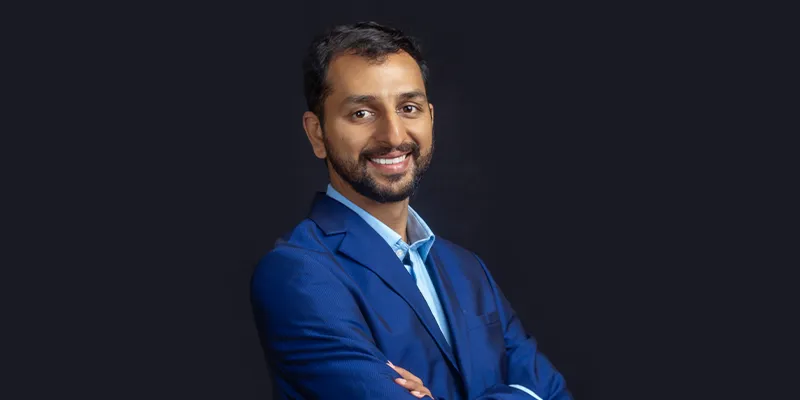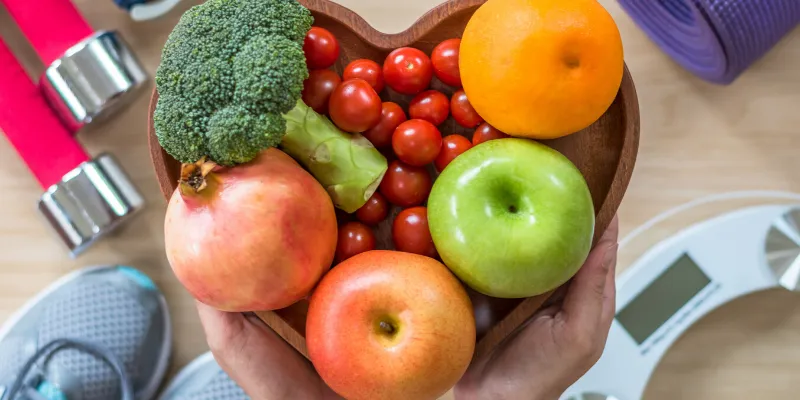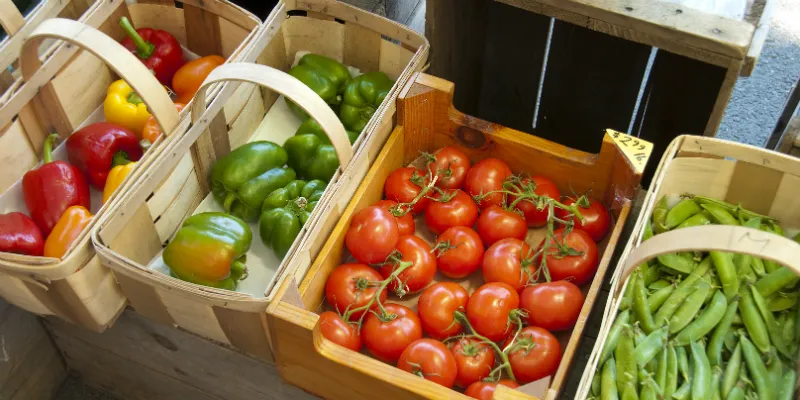'Change your diet to reverse disease': Nikhil Chaudhary, wellness coach & dietitian
Here are some tips from a wellness coach on how to stay healthy during the COVID-19 lockdown period and beyond
Spinach or kale? Brussel sprouts or asparagus? Zumba or Pilates? Spin classes or Hip-Hop abs? Which one should you choose?
The world is going into a frenzy trying to stay healthy during the COVID-19 lockdown. People have been blitzing green juices in their blenders, skipping rope in their living rooms, doing jumping jacks in the halls and lifting hand weights at random. The internet is abuzz with information as health webinars are beamed, fitness videos are uploaded and doctors offer reams of information on how to stay fit during the COVID-19 lockdown. Health is top priority now and staying well is our mission.
But the fact that most people are painfully aware of, is that it is easy to slip back into our old unhealthy ways once life comes back to normal. In an exclusive interview with YSWeekender, Wellness coach and Dietitian, Nikhil Chaudhary talks about how health and lifestyle changes must remain a constant in our lives if we are to fight viruses and bacteria that will inevitably come our way during our lifetime.
Nikhil has cured deadly lifestyle diseases such as cancer, diabetes, blood pressure, cholesterol, liver disease. NRIs from 25 countries including Sri Lanka, US, Canada, UK, Iceland, Dubai, Honk Kong, China and Brazil, are in touch with him regularly through WhatsApp and other social media for consultations.
If you want to get well, begin with your nutrition, says Nikhil and goes on to tell YSWeekender how to make healthy choices and reverse disease the right way for a lifetime.

Nikhil Chaudhary
Edited excerpts from the interview:
YSWeekender: Is it true that nutrition can help in fighting deadly viruses?
Nikhil Chaudhary: Ultimately it is your immune system that fights viruses and food can impact the immune system in a positive or negative way. Neutrophils, which are the largest group of immune cells in the body cannot function without vitamin C. This vitamin activates them while sugar inactivates their function.
Antibodies that fight such viruses are also not produced effectively if the person is obese which is directly related to our food consumption.
YSW: Tell us little about the importance of diet and lifestyle and how are you working to promote it?
NC: Most diseases like diabetes, heart disease, cancers among others are not genetic and a lot of scientific evidence is coming out on this. These diseases happen because of an unhealthy diet and lifestyle.
Unfortunately, most people when diagnosed with such conditions are told that this is now their destiny. Once they know that diseases can be reversed, half the battle is won. They have a choice which they never knew existed and that is the beginning of change.
I conduct talks and webinars on the subject and run WhatsApp groups of health enthusiastic people. I have started a YouTube channel, writing books on how to reverse acidity, diabetes and cholesterol, consult with patients and help them overcome all an unhealthy lifestyle.
YSW: Can you give us three tips to build immunity so people can follow that during lockdown?
NC:
- Avoid sugar and include a lot of vitamin C rich foods.
- Sunbathe for minimum 30 minutes every day.
To fight viruses probably the best technique is to drink a lot of liquids. About 6-7 litres per day. Include coconut water, buttermilk, turmeric water, lemon water, green tea and mineral water in your diet
YSW: After this difficult period, will our focus shift to health? What changes do you foresee?

Health should be our focus even after the coronavirus lockdown
NC: We often take things take for granted. Right now, people are trying to focus on their health and have become aware of why it is important to take care of themselves. Whether it will continue once the lockdown is open is difficult to say. Most people will get so busy with their daily routines once again and will forget that there is nothing more important than health.
But the important question also is, are we getting the right inputs?
Health doesn't mean only washing hands, regular tests and visiting a doctor. In reality health means not getting sick and if you are sick then recovering quickly. That awareness is important along with knowledge on how to achieve it. They must also know that it is possible to reverse diseases in most cases using food and lifestyle. Much of your health is in control and not at the mercy of someone else.
YSW: How did you get on this journey of nutrition? What diseases have you reversed through diet?
NC: I am a B Tech in biotechnology and I also have a master's degree in Dietetics. In my pursuit of helping people overcome their diseases, I kept on looking for answers in genetics. But the deeper I delved, it became more and more clear that genes and DNA only enable what the cells want and they are not dictators.
Ultimately it is the internal environment of the body which signals the cells and that dictates the outcome.
I started helping people around by diet and lifestyle changes to reverse diabetes, cholesterol, fatty liver, and so on till someone approached me for a last stage cancer patient who was sent home to die.
We helped her with dietary changes and the lady who was supposedly on her death bed started moving around. After a span of 10 months, her scan showed that the cancer had reduced. Subsequent scans showed similar patterns.
In the last so many years I have seen reversal of simple conditions like acidity, constipation, obesity to complex ones like last stage cancers, diabetes, fatty liver disease, PCOD, Dyslipidemia (Cholesterol & Triglycerides), even women could conceive naturally, depression, infections and a lot more. Autoimmune diseases, however, are not easy to reverse.
The challenge that I always face is the fight between the mind and the taste buds. The food industry is constantly pushing products that elevate reward hormones and eventually make us addicted to certain foods
YSW: What kind of lifestyle changes have you seen over the years, like awareness of health and diet trends?
NC: People are aware more than ever about their health. Few people take action and schedule time for exercise. Most people only contemplate about it but take no action. This is because they find it way too difficult, unsustainable and no immediate results.
There are also a lot of diets that have been popularised since a few decades like Paleo, Atkins and one of the most recent fad is Keto. The good thing about any diet in the world is that it eliminates junk foods.
When it comes to health, people are usually obsessed only about their weight. This obsession needs to go.
In India generally the talk about healthy food ends in a single sentence, ‘Ghar ka khana is healthy and bahar ka khana is unhealthy' (‘Home cooked food is healthy and outside food is unhealthy’). But this is not true if you are frying pakoras at home!
YSW: What are some food tips you can give us?
NC: It is important to analyse if something should be eaten or not…

Eat foods that come from the farm to your table
The first question you should ask yourself should be - can I buy this food from a farmer? If the answer is yes then it is good for you. For example, you should choose tomatoes over ketchup, wheat over maida, sugarcane over sugar, fruits over juices, green mung over yellow polished mung, red rice over white rice and steel cut oats over rolled oats.
- Avoid food that needs high heat for processing. Go for mostly water-based cooking techniques.
- More than 90% antibiotics that are used for animal rearing are very dangerous. Make sure you buy only organic products when it comes to non-vegetarian foods.
- Stick to cold pressed oils and use these oils for garnishing only. Avoid high heat cooking and also roasting of nuts and seeds. Every oil has a smoking temperature, beyond which it gets rancid and carcinogenic, meaning it can cause cancer Ghee and coconut oil are safer and can sustain higher temperatures than other oils.
- Also remember, it is never a single food that matters. It is always what else you eat during the day. Your overall diet needs to be considered.
What we eat determines internal environment of our body. This environment signals our cells and accordingly the genes produce proteins that do different functions. So, food dictates the outcome of health.
Medicines on the other hand have side effects. When we take a medicine for cholesterol, it doesn't evaporate the cholesterol out of the body. It will only change forms from cholesterol to something else. So, medicines should be our last option. For long term chronic conditions, we should focus on food and lifestyle.
YSW: What is your advice to people who want to get into the field of nutrition?
NC: It is the need of the hour, but it is not a very well-paid job. You need to learn much more than the course teaches you. Get into it only if you are passionate about it and build your base of biochemistry, microbiology, physiology and pathology, apart from nutrition related subjects.
The biggest challenge in your career will be to change other people. It is easy to tell people what to eat and what not to eat but to help them change is the biggest task of all. So, you must study psychology too.
YSW: What are some of the worst myths you have come across in your career?
NC: There are too many myths but the biggest myth of all, is that many of the diseases in the world are genetic and cannot be reversed. This mindset needs to change.









